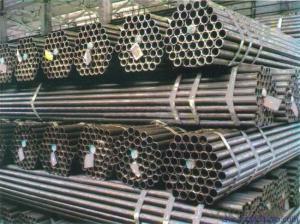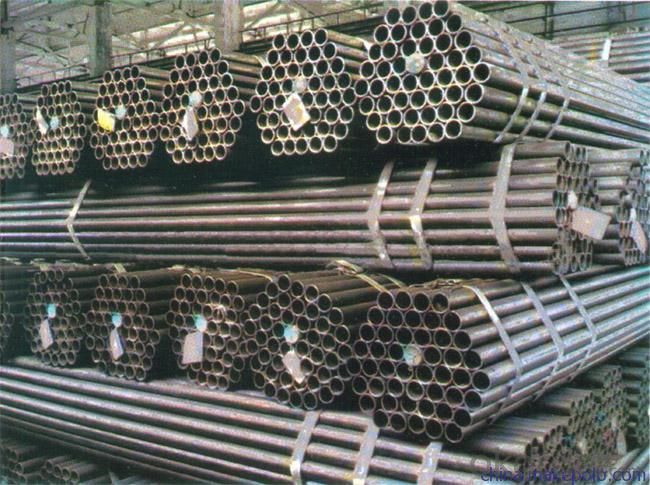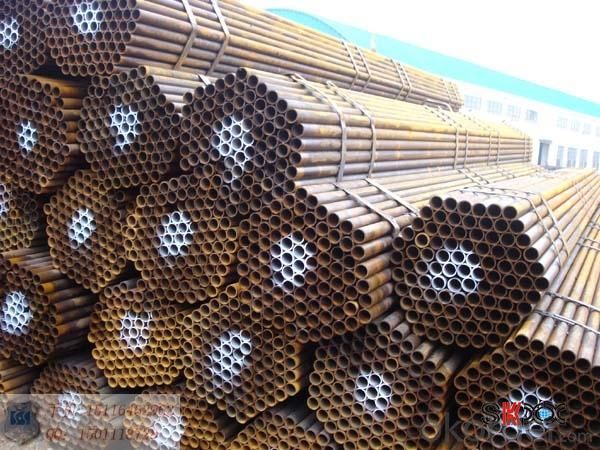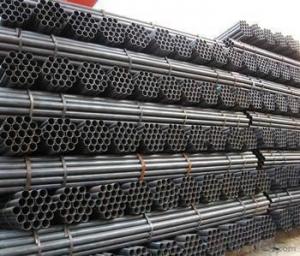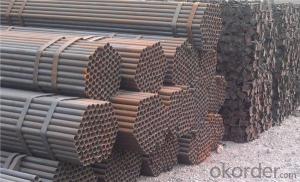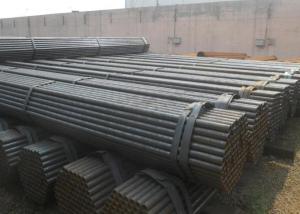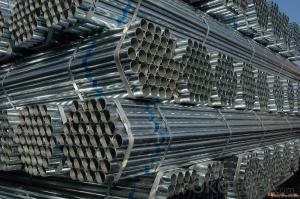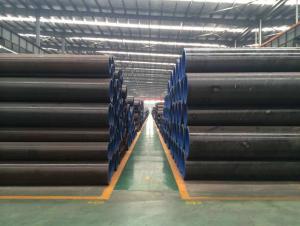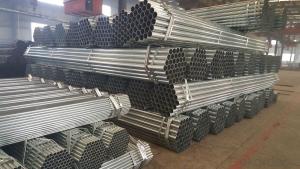Welded Black ERW Steel Pipe ASTM Standard
- Loading Port:
- Tianjin
- Payment Terms:
- TT OR LC
- Min Order Qty:
- 25 m.t.
- Supply Capability:
- 7500 m.t./month
OKorder Service Pledge
OKorder Financial Service
You Might Also Like
1、Structure of Welded Black ERW Steel Pipe ASTM Standard:
Welded Black ERW Steel Pipe ASTM Standard is electric resistance welding, the abbreviation for ERW for transporting oil and natural gas vapor liquid objects, can meet the requirements of high and low pressure, the transport in the world with pipe sector accounted for a pivotal position.With sound reputation and high quality , we will offer clients a wonderful business experience.
2、Main Features of Welded Black ERW Steel Pipe ASTM Standard:
• High manufacturing accuracy
• High strength
• Good visual effect
• Good view and appearance
• Good shape
• Reasonable price
• Small inertia resistance
• Strong heat dissipation ability
3、Welded Black ERW Steel Pipe ASTM Standard Specification:
Standard | GB, DIN, ASTM ASTM A106-2006, ASTM A53-2007 |
Grade | 10#-45#, 16Mn 10#, 20#, 45#, 16Mn |
Thickness | 1 - 33 mm |
Section Shape | Round |
Outer Diameter | 21 - 610mm |
Place of Origin | Tianjin, China (Mainland) |
Secondary Or Not | Non-secondary |
Application | Hydraulic Pipe |
Technique | Cold Drawn |
Certification | API |
Surface Treatment | factory state or painted black |
Special Pipe | API Pipe |
Alloy Or Not | Non-alloy |
Length | 5-12M |
Outer Diameter | 21.3-610mm |
Grade | 20#, 45#, Q345, API J55, API K55, API L80, API N80, API P110, A53B |
Standard | ASME, ASTM |
1) Material:20#(ASTM A 106/A53 GRB.API5LGRB,GB),45#,16Mn,10#.
2) Specification range:OD:21.3-610mm,WT:6-70mm,length:6-12m or according to the requirement of clients.
3) Excutive standards:GB,ASME API5L.ASTM A 106/A53,Despite of the above standards,we can also supply seamless steel pipe with standard of DIN,JIS,and so on,and also develop new products according to the requirements of our clients!
4) Surface:black lacquered,varnish coating or galvanized.
5) Ends:Beveled or square cut,plastic capped,painted.
6) Packing:bundles wrapped with strong steel strip,seaworthy packing.
4、Packaging & Delivery
Packaging Details: | seaworthy package,bundles wrapped with strong steel strip |
Delivery Detail: | 15-30days after received 30%TT |
5、FAQ of Welded Black ERW Steel Pipe ASTM Standard:
①How is the quality of your products?
Our products are manufactured strictly according to national and internaional standard, and we take a test
on every pipe before delivered out. If you want see our quality certifications and all kinds of testing report, please just ask us for it.
Guaranteed: If products’ quality don’t accord to discription as we give or the promise before you place order, we promise 100% refund.
②How about price?
Yes, we are factory and be able to give you lowest price below market one, and we have a policy that “ for saving time and absolutely honest business attitude, we quote as lowest as possible for any customer, and discount can be given according to quantity”,if you like bargain and factory price is not low enough as you think, just don’t waste your time.Please trust the quotation we would give you, it is professional one.
③Why should you chose us?
Chose happens because of quality, then price, We can give you both.Additionally, we can also offer professional products inquiry, products knowledge train(for agents), smooth goods delivery, exellent customer solution proposals.Our service formula: good quality+good price+good service=customer’s trust
SGS test is available, customer inspection before shipping is welcome, third party inspection is no problem.
6、 Welded Black ERW Steel Pipe ASTM Standard Images:
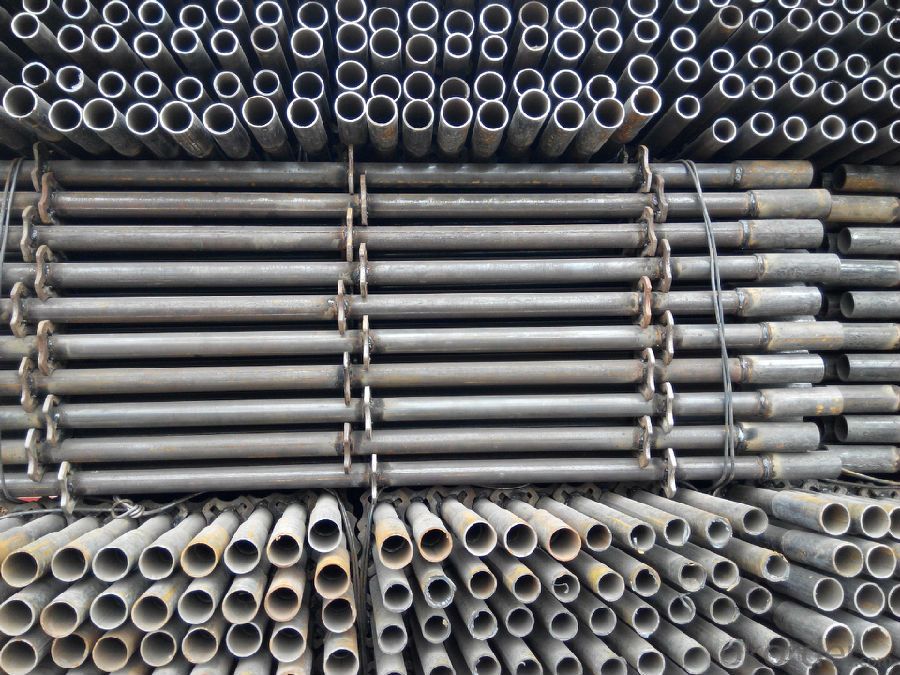
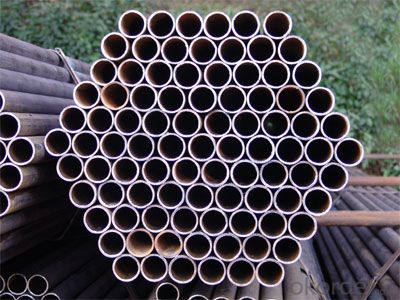
- Q: Can steel pipes be used for steam applications?
- Yes, steel pipes can be used for steam applications. Steel is a widely used material in steam systems due to its high strength, durability, and resistance to high temperatures and pressure. It is commonly used in industries such as power generation, refineries, and petrochemical plants for carrying and distributing steam. However, it is important to ensure that the steel pipes are properly designed, installed, and maintained to withstand the specific conditions and requirements of steam applications.
- Q: Can steel pipes be used for transporting liquids and gases?
- Yes, steel pipes can be used for transporting both liquids and gases. Steel pipes are known for their durability, strength, and resistance to corrosion, making them suitable for a wide range of applications, including the transportation of fluids and gases. They are commonly used in industries such as oil and gas, water supply, sewage systems, and chemical processing plants. Steel pipes provide a reliable and efficient means of conveying liquids and gases over long distances, ensuring the safe and efficient transportation of these substances.
- Q: What are the standard specifications for steel pipes?
- The standard specifications for steel pipes vary depending on the specific application and industry requirements. However, some common standard specifications for steel pipes include dimensions, material composition, strength, and testing procedures. These standards are set by organizations such as the American Society for Testing and Materials (ASTM), the International Organization for Standardization (ISO), and other national or international bodies. It is important to consult the appropriate standard specifications for specific project needs.
- Q: How are steel pipes used in the manufacturing of machinery and equipment?
- Steel pipes are commonly used in the manufacturing of machinery and equipment due to their strength, durability, and versatility. They serve various purposes such as the transportation of fluids, gases, and materials within the machinery, acting as structural components, providing support for moving parts, and facilitating heat transfer or cooling. Steel pipes also allow for easy assembly and disassembly, making them essential in the manufacturing process of machinery and equipment.
- Q: How do steel pipes handle expansion and contraction?
- Steel pipes handle expansion and contraction through their inherent flexibility and ability to withstand temperature variations. As steel is a ductile material, it can expand and contract without significant deformation or structural damage. Additionally, the use of expansion joints or loops in piping systems allows for controlled movement and accommodates thermal expansion and contraction effectively.
- Q: How do you join steel pipes together?
- Steel pipes can be joined together using various methods, including welding, threaded connections, flanges, and mechanical couplings. The most common method is welding, where the ends of the pipes are heated and fused together using a welding electrode. Threaded connections involve screwing the pipes together using male and female threads. Flanges are used for larger pipes and involve bolting two flanges together with a gasket in between. Mechanical couplings use compression or clamping mechanisms to connect pipes without the need for welding or threading.
- Q: What is PE coated steel pipe? Seek explanation
- PE pipe is a kind of thermoplastic resin with high crystallinity and non polarity.
- Q: Are steel pipes suitable for industrial applications?
- Steel pipes are an excellent choice for industrial applications. They come with several advantages that make them the preferred option in various industries. Firstly, their strength and durability are exceptional, enabling them to withstand high pressure and heavy loads. This makes them perfect for transporting liquids, gases, and solids. Furthermore, steel pipes exhibit high resistance to corrosion, a critical feature in industrial settings where exposure to harsh chemicals, moisture, and extreme temperatures is common. Their corrosion-resistant properties ensure a longer lifespan and reduce the need for frequent maintenance and replacements. Additionally, steel pipes have a smooth interior surface, minimizing friction and allowing for efficient material flow. This is particularly vital in industries like oil and gas, where the smooth flow of fluids is essential for proper operations. Moreover, steel pipes offer a wide range of sizes and thicknesses, allowing for customization and flexibility in design. They can be easily welded and connected, facilitating simple installation and modification as per specific industrial requirements. Overall, steel pipes provide a combination of strength, durability, corrosion resistance, and versatility, making them highly suitable and widely used in various industrial applications such as oil and gas, construction, water treatment, power generation, and chemical processing.
- Q: How are steel pipes used in the manufacturing of desalination plants?
- Steel pipes are used in the manufacturing of desalination plants for various purposes, such as transporting seawater, brine, and freshwater through different stages of the desalination process. They are also used for the construction of pipelines, intake systems, and discharge outlets, ensuring durability, corrosion resistance, and efficient water flow in these critical systems.
- Q: How are steel pipes protected against rust?
- Steel pipes are protected against rust through a variety of methods. One common method is by applying a protective coating to the pipes. This can be done by using a layer of paint, epoxy, or a corrosion-resistant coating such as zinc or galvanized coatings. These coatings act as a barrier between the steel and moisture, preventing the formation of rust. Another method of protecting steel pipes against rust is by using cathodic protection. This involves the use of sacrificial anodes, typically made of zinc or magnesium, which are attached to the steel pipes. These anodes corrode instead of the steel, sacrificing themselves and preventing rust formation on the pipes. In addition to coatings and cathodic protection, steel pipes can also be protected against rust by using corrosion inhibitors. Corrosion inhibitors are chemicals that are added to the water or fluid flowing through the pipes. These chemicals form a protective film on the surface of the steel, inhibiting the corrosion process and preventing rust from forming. Regular maintenance and inspections are also crucial in protecting steel pipes against rust. Any signs of damage or wear on the protective coatings should be addressed promptly to prevent rust from developing. Additionally, ensuring that the pipes are properly cleaned and dried before applying any protective coatings can also help in enhancing their effectiveness. Overall, a combination of protective coatings, cathodic protection, corrosion inhibitors, and regular maintenance is employed to ensure that steel pipes are effectively protected against rust and corrosion, prolonging their lifespan and maintaining their structural integrity.
Send your message to us
Welded Black ERW Steel Pipe ASTM Standard
- Loading Port:
- Tianjin
- Payment Terms:
- TT OR LC
- Min Order Qty:
- 25 m.t.
- Supply Capability:
- 7500 m.t./month
OKorder Service Pledge
OKorder Financial Service
Similar products
Hot products
Hot Searches
Related keywords
